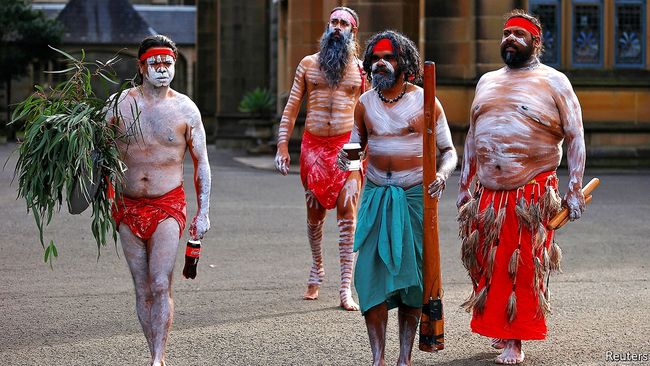https://www.economist.com/news/asia/21724858-would-other-australians-vote-aborigines-want-more-mention-australias
Counted but not yet heard
Aborigines want more than a mention in Australia’s constitution
But would other Australians vote for that?
经济学家
Print edition| Asia
Jul 6th 2017| SYDNEY
LINDA BURNEY was ten when Australians voted in 1967 to remove the clause in the constitution that excluded aborigines from the national census. “The notion that you weren’t worthy of being counted was very painful,” she recalls. Ms Burney belongs to the Wiradjuri clan, and grew up in rural New South Wales. Last year she became the first aboriginal woman to be elected to the lower house of the federal parliament. Australians should soon get the chance to vote on another constitutional amendment concerning aboriginal rights. The new one is intended to go quite a bit further than that of 1967, in some way acknowledging aborigines as the first Australians. But just how far it should go is a matter of intense debate.
In late 2015 Malcolm Turnbull, the conservative prime minister, and Bill Shorten, the leader of the opposition Labor party, agreed to set up a council to propose a specific change to be put to a referendum. On June 30th the referendum council delivered its recommendation to the government, which has not yet made it public. Mark Leibler, the council’s co-chair, says the referendum will be an “important milestone in Australia’s history”.
Aborigines inhabited Australia for perhaps 60,000 years before the British began settling it in the late 18th century. But they were excluded from the conventions that drew up the constitution in the 1890s. The document only acknowledged their existence insofar as it denied them certain rights. It also imposed a high bar for amendments: a majority of voters nationwide, plus a majority in at least four of the six states. Just eight of 44 proposed changes have succeeded. Yet the amendment 50 years ago to include aborigines in the census was approved in every state, and by more than 90% of voters nationwide—a record to this day.
Aborigines are about 3% of Australia’s 24m people. They are more likely to go to prison and tend to die younger than most Australians. Ken Wyatt, one of five aborigines in the federal parliament, says a few aboriginal MPs are not enough to achieve an “aboriginal voice” on issues affecting his people.
At a referendum 18 years ago Australians rejected a clunky proposal by John Howard, the prime minister at the time, to mention aborigines in the constitution’s preamble. Mr Wyatt is “glad” it failed: “It was done in haste with the wrong set of words.” (The proposal simply spoke of “honouring” indigenous people “for their deep kinship with their lands and for their ancient and continuing cultures which enrich the life of our country”; veterans and immigrants also got a shout-out.)
This time, the referendum council took a different approach. For six months it consulted indigenous people around Australia, culminating in a “First Nations National Constitutional Convention” at Uluru (Ayers Rock), in central Australia in late May. The resulting “Uluru Statement” demanded more than token recognition. It called for “Makarrata”, or “agreement-making between governments and First Nations”—a treaty, in other words. (Unlike those in neighbouring New Zealand, the British colonisers in Australia never signed any treaties with the indigenous people.)
A treaty would not necessarily involve constitutional change. But the convention’s other big demand would: it asks for a “First Nations voice enshrined in the constitution”. At the very least, this seems to mean that aborigines should have some formal involvement in the drafting of laws that affect them. “In 1967 we were counted,” the convention declared. “In 2017 we seek to be heard.”
Distilling all this into a referendum question will be a challenge. Mr Leibler expects the council’s report will be released after the council meets Messrs Turnbull and Shorten later this month. Its proposal, he says, will be “reasonable, moderate and achievable”, with “a great deal of respect for the Uluru Statement”.
Ms Burney would like to add a further element to the mix. Two embarrassingly antiquated articles of the constitution—one allowing the use of racial criteria in defining eligible voters and one allowing laws specific to particular races to be made—should be deleted. Unless these “race powers” are finally discarded, she says, the referendum’s legitimacy will be diminished.
A vote had been projected for this year, but is now unlikely before 2018. For some indigenous leaders, the risk that a substantive amendment might be defeated is reason to delay even further. Such an outcome might set their cause back decades and would embarrass all involved. Political and business leaders seem more optimistic. So is Ms Burney, who sees the vote as part of a bigger process of reconciliation: “I think Australia is up for it.”
This article appeared in the Asia section of the print edition under the headline"Counted but not heard"
